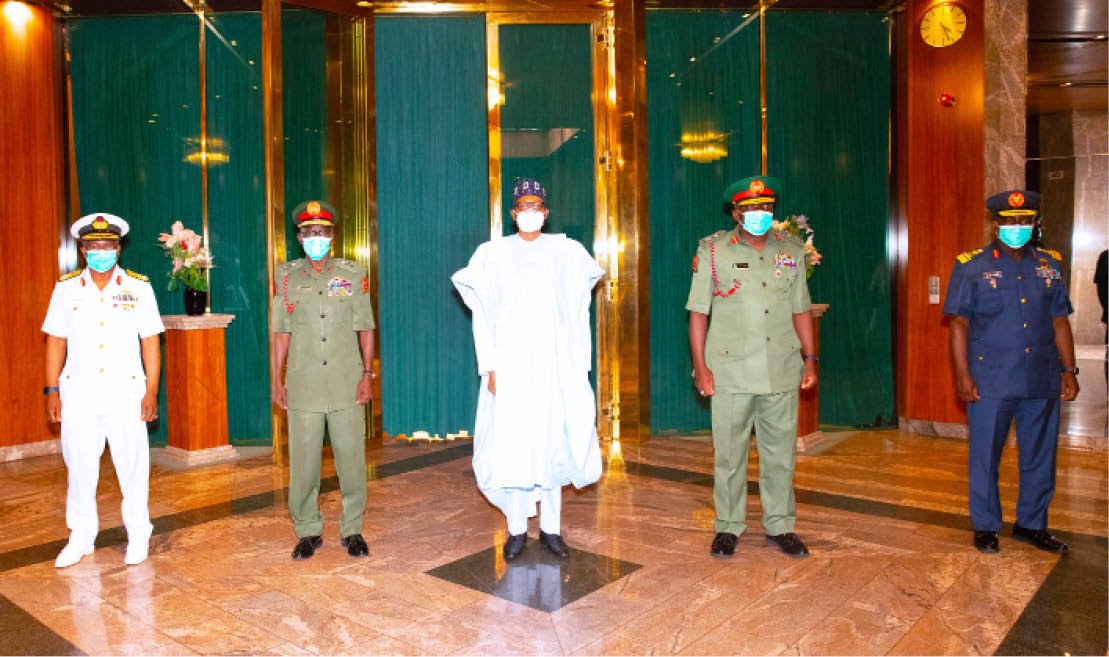The relatives, friends, kinsmen and women of Major General Leo Irabor, Major General Ibrahim Attahiru, Rear Admiral Awwal Zubairu Gambo and Air Vice Marshal Isiaka Oladayo Amao are in a celebratory mood right now, but the task facing these men is Herculean and they require everyone’s support, sympathy and prayers rather than noisy celebration.
On Tuesday January 26th, after a public clamour for many years including two Senate resolutions, President Muhammadu Buhari appointed Irabor as new Chief of Defence Staff, Attahiru as Chief of Army Staff, Gambo as Chief of Naval Staff and Amao as Chief of Air Staff. They replaced General Abayomi Olonishakin, Lt Gen Tukur Yusuf Buratai, Vice Admiral Ibok-Ete Ekwe Ibas and Air Marshal Sadique Abubakar respectively who resigned, according to the Presidency. They had headed the military services since July 2015 and had their terms extended several terms.
- What Nigerians expect from the new service chiefs
- Moves to get Jonathan into 2023 presidential race intensify
The clamour to replace the former chiefs was not because people were tired of seeing their faces. Their overstay had caused problems within the military services because sets of officers junior to them had had to retire without having a chance to reach the peak of their careers. For the wider public though, the main concern was that the war against insurgency and banditry has dragged on for too long, with no end in sight, and there were fears that the old service chiefs had run out of fresh ideas.
Maybe they had, but history must be kind to the former service chiefs. Buratai, for example, unfolded one new strategy after another and on many occasions he personally led troops into battle. The Air Force, on its part, moved under Sadique from a marginal contributor in the fight against Boko Haram to a central factor in recent times. Its daily bombing and strafing campaign against the insurgents has warmed the hearts of Nigerians and has severely degraded the insurgents’ capacity to wage war. Under Ibas too, the Navy heightened its activity against Gulf of Guinea pirates as well as oil thieves in the coastal regions.
Very laudable though those achievements were, our frustration was that the war against insurgents did not end despite repeated assurances by political and military leaders. In fact, banditry increased in tempo, almost overwhelmed North West and North Central states and has now spilled into South West region. It was not the primary duty of the military to fight insecurity but since the police could no longer handle it, the service chiefs were called in to help. They did a lot, but the problem still festers, which was why Nigerians were frustrated.
We do not expect the new chiefs to wave a magic wand and end our national insecurity nightmare. But we expect them to bring in new ideas, fresh enthusiasm and greater motivation of the troops in order to bring insecurity to a quick end. They know the problem first hand because both Irabor and Attahiru were former Theatre Commanders of Operation Lafiya Dole, the biggest military game in town. They should also end inter-agency rivalry and lack of cooperation that has hindered the optimal pooling of resources to end this war. Buhari has reminded them to always take care of the welfare of their men; wars are won by men more than by weapons.
Buhari made a mistake in appointing the new service chiefs and they assumed duty without Senate confirmation. The Presidency later recovered and sent their names to Senate for confirmation. This is a serious error, probably caused by the fact that he had not appointed service chiefs for nearly six years and had forgotten how it is done. Given the onerous task before these men and the possible cost in lives to any delay, we urge senators to overlook this gaffe and speedily confirm the new service chiefs. We look up to them to end our national insecurity nightmare with all deliberate speed.

 Join Daily Trust WhatsApp Community For Quick Access To News and Happenings Around You.
Join Daily Trust WhatsApp Community For Quick Access To News and Happenings Around You.


